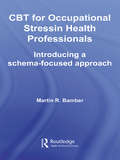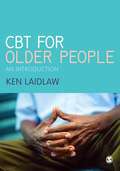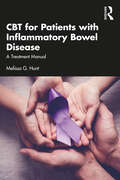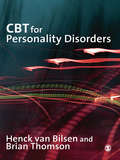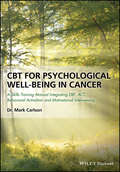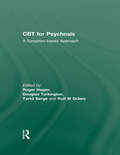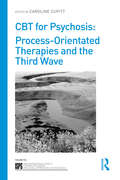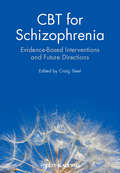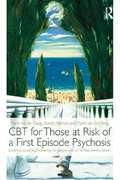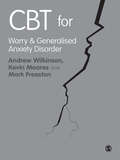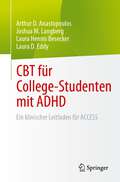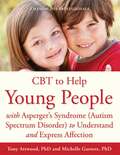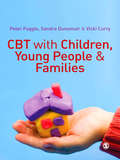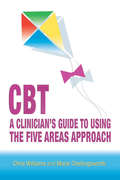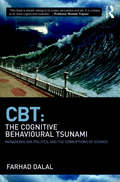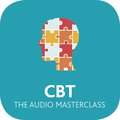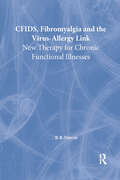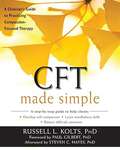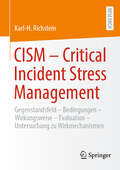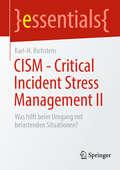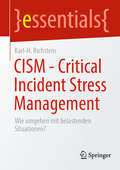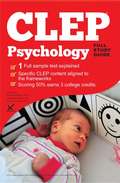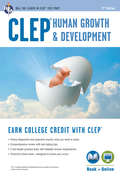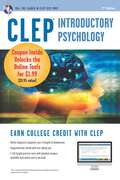- Table View
- List View
CBT for Occupational Stress in Health Professionals: Introducing a Schema-Focused Approach
by Martin R. BamberThe costs of occupational stress in terms of sickness absence, ill-health-related retirement, litigation and lost productivity are increasing, putting strain on economies across the world. The fact that health care work is inherently more stressful than many other occupations makes it vital that the problem of occupational stress among health professionals is addressed. CBT for Occupational Stress in Health Professionals goes beyond simply defining the problem and fills a gap in the current literature by providing clear and concise individual treatment interventions. In three parts, the book covers: an overview of stress in the occupational context the standard CBT approach to assessment, formulation and treatment a new schema-focused approach to treating occupational stress. The schema-focused approach presented here provides powerful tools for treating a range of work-related problems for which standard CBT approaches are ineffective. Case studies are presented throughout the book to illustrate the therapeutic approaches described. This book will be of huge benefit to clinical and organizational psychologists, psychiatrists, mental health workers, counsellors and anyone else involved in treating occupational stress. It will also have much to offer those who manage people suffering from stress, human resource workers and those who are experiencing work-related stress.
CBT for Older People: An Introduction
by Kenneth LaidlawGoing beyond simple procedural modifications, this is the first book to address how the application of gerontology to CBT practice can augment CBT's effectiveness and appropriateness with older people. Taking you step-by-step through the CBT process and supported by clinical case examples, therapeutic dialogue, points for reflection and hints and tips, the book examines: - basic theoretical models in CBT and how to relate them to work with older people - main behavioural interventions and their practical application - social context and relevant theories of aging - implications of assessment, diagnosis and treatment - issues of anxiety, worry and depression, and more specialist applications of CBT for chronic illnesses - latest developments, thinking and empirical evidence. This is an invaluable companion for any clinical psychology, counselling, CBT/IAPT, and social care trainee or professional new to working with older people, especially those who are keen to understand how the application of CBT may be different. Professor Ken Laidlaw is Head of the Department of Clinical Psychology, University of East Anglia.
CBT for Older People: An Introduction
by Kenneth LaidlawGoing beyond simple procedural modifications, this is the first book to address how the application of gerontology to CBT practice can augment CBT’s effectiveness and appropriateness with older people. Taking you step-by-step through the CBT process and supported by clinical case examples, therapeutic dialogue, points for reflection and hints and tips, the book examines: - basic theoretical models in CBT and how to relate them to work with older people - main behavioural interventions and their practical application - social context and relevant theories of aging - implications of assessment, diagnosis and treatment - issues of anxiety, worry and depression, and more specialist applications of CBT for chronic illnesses - latest developments, thinking and empirical evidence. This is an invaluable companion for any clinical psychology, counselling, CBT/IAPT, and social care trainee or professional new to working with older people, especially those who are keen to understand how the application of CBT may be different. Professor Ken Laidlaw is Head of the Department of Clinical Psychology, University of East Anglia.
CBT for Patients with Inflammatory Bowel Disease: A Treatment Manual
by Melissa G. HuntThis treatment manual provides cognitive behavioral therapists with the inflammatory bowel disease (IBD) specific knowledge and content they need to work with this patient population.Understanding the very real challenges of living with an IBD, and what sorts of catastrophic thoughts and maladaptive avoidance behaviors patients might have, can make therapy more focused, efficient, and effective. This manual encourages flexible, modular deployment of numerous empirically supported principles, techniques, and interventions, and includes five treatment protocols with hypothetical patients.This book is essential for therapists with training in cognitive behavioral therapy who are interested in expanding their practice competence to work with patients with GI disorders, including inflammatory bowel disease.
CBT for Personality Disorders
by Brian Thomson Henck van BilsenThis key new text on CBT for personality disorders offers a unique trainee guide to this complex area. The book provides a practical, hands-on overview of the treatment strategies for working with personality disorders, linking these with the theory of both cognitive and behavioural approaches. Covering the full range of personality disorders, this is the most rounded and introductory guide yet. Key content includes: - therapist self-care; avoiding pitfalls - holding the CBT line in challenging circumstances, across a range of multi-disciplinary settings - exploration of the therapeutic relationship and engagement strategies - reflections on the evidence for CBT and personality problems - chapter introductions and summaries, key learning points and reflective questions - case examples and vignettes. This book is an important resource for anyone wishing to use their CBT training with clients presenting personality disorders.
CBT for Psychological Well-Being in Cancer: A Skills Training Manual Integrating DBT, ACT, Behavioral Activation and Motivational Interviewing
by Mark CarlsonCBT for Psychological Well-Being in Cancer is the first clinical manual to target psychological well-being in cancer by combining skill sets from DBT and other well-researched approaches, providing clinical material in a clear session-by-session structure organized by topic. The first skills training manual in the field to provide an integrated session-by-session outline that clinicians can customize for their own needs Adaptive and contextualist in approach – Carlson integrates skill sets from DBT, ACT, behavioral activation, and motivational Interviewing to promote efficacy and cost-effectiveness The text provides a unique range of resources to support for clinicians, including session guides, specific interventions, client handouts, and invaluable measurement and tracking tools for those clinicians required to report outcomes The content can be flexibly deployed by clinicians into their existing work to meet the needs of specific patients in individual or group treatment contexts, by selecting the most appropriate sessions, skills, and handouts
CBT for Psychosis: A Symptom-based Approach (The International Society for Psychological and Social Approaches to Psychosis Book Series)
by Douglas Turkington Roger Hagen Torkil Berge Rolf W. GråweThis book offers a new approach to understanding and treating psychotic symptoms using Cognitive Behavioural Therapy (CBT). CBT for Psychosis shows how this approach clears the way for a shift away from a biological understanding and towards a psychological understanding of psychosis. Stressing the important connection between mental illness and mental health, further topics of discussion include: the assessment and formulation of psychotic symptoms how to treat psychotic symptoms using CBT CBT for specific and co-morbid conditions CBT of bipolar disorders. This book brings together international experts from different aspects of this fast developing field and will be of great interest to all mental health professionals working with people suffering from psychotic symptoms.
CBT for Psychosis: Process-orientated Therapies and the Third Wave (The International Society for Psychological and Social Approaches to Psychosis Book Series)
by Caroline CupittCognitive Behaviour Therapy (CBT) for psychosis is constantly changing and evolving. Recently, in what is sometimes called the ‘third wave’, therapy has become more concerned with the individual’s relationship to their experience, rather than with the content of it. This more process–orientated approach appears to tap into universal psychological processes. The aim is to reduce distress by changing the function of the experience, rather than necessarily the experience itself. Written by some of the leading figures from around the world, CBT for Psychosis: Process-Orientated Therapies and the Third Wave brings the reader the latest developments in the field. Presented in three parts, CBT for Psychosis first explores theoretical perspectives on recent developments in cognitive behavioural therapies. Part two examines specific therapeutic approaches, including metacognitive training, mindfulness, acceptance and commitment therapy, compassion focused therapy and the method of levels. Finally, part three presents two critical perspectives: the first offering a reflection on the experience of receiving CBT, and the second looking ahead to possible future developments. Offering a cutting-edge collection of theoretical, therapeutic and critical perspectives, CBT for Psychosis: Process-Orientated Therapies and the Third Wave will be of great interest to clinical and counselling psychologists, both practising and in training, as well as psychiatrists, nurse therapists, occupational therapists and other healthcare professionals working with people experiencing psychosis.
CBT for Schizophrenia
by Craig SteelInformed by the latest clinical research, this is the first book to assemble a range of evidence-based protocols for treating the varied presentations associated with schizophrenia through Cognitive Behavioural TherapyDeals with a wide range of discrete presentations associated with schizophrenia, such as command hallucinations, violent behaviour or co-morbid post-traumatic stress disorderCovers work by the world's leading clinical researchers in this fieldIncludes illustrative case material in each chapter
CBT for Those at Risk of a First Episode Psychosis: Evidence-based psychotherapy for people with an 'At Risk Mental State'
by Dorien Nieman Mark van der Gaag David van den BergCan severe mental illness be prevented by early intervention? Mental illness is highly prevalent in the general population and has its onset mostly in adolescence and young adulthood. Early intervention usually leads to improved prognosis. This book describes a newly developed, evidence based cognitive behavioural intervention that can be used by clinicians to treat the precursor symptoms of psychosis and other severe mental illness. CBT for those at risk of a First Episode Psychosis offers a detailed new psychotherapy that has been shown to reduce the chance of transition to a first psychotic episode and to improve the chance for recovery. This encompasses: Psycho-education about prepsychotic symptoms A review of literature about psychological processes that are known to play a role in the development of psychosis A comprehensive manual – illustrated by numerous clinical vignettes - that can be used to treat help-seeking subjects with an increased risk of developing psychosis. Links to online resources and exercises to be used in therapy and education. A description of the multicentre randomized clinical trial investigating this new psychotherapy. The vast collective experience and expertise of the authors of this handbook results in an invaluable text for clinicians working in mental health care, as well as students, lecturers and researchers who have an interest in the prevention of schizophrenia and other severe mental illness.
CBT for Worry and Generalised Anxiety Disorder
by Mark Freeston Kevin Meares Andrew WilkinsonThis practical introduction helps trainees use cognitive behavioural therapy to assess and treat generalised anxiety disorder (GAD), one of the most commonly presented client issues. Taking the reader step-by-step through each stage of CBT with anxiety and worry, the authors illustrate the whole range of different treatment techniques whilst keeping the book accessible and concise. Tailored to current High and Low Intensity (IAPT) training, it covers self-help literature as well as traditional one-to-one therapy. The book: - contains illustrative case material, balancing an evidence-based approach with awareness of the realities of today's practice - alerts trainees to the potential complicating factors and the co-existence of other anxiety or mood disorders alongside GAD - addresses cross-cutting professional themes, such as working with morbidity and the pressures of working within NHS settings. Bridging the gap between theory and practice, this book is essential reading for all CBT trainees on IAPT programmes, as well as trainees on postgraduate counselling, psychotherapy and clinical psychology courses. Qualified therapists who require an update in this area will also find this a useful resource.
CBT für College-Studenten mit ADHD: Ein klinischer Leitfaden für ACCESS
by Arthur D. Anastopoulos Joshua M. Langberg Laura Hennis Besecker Laura D. EddyDieses Buch bietet einen Überblick über das ACCESS-Programm, ein Programm für die psychische Gesundheit, das als wirksame Behandlung für Studenten mit ADHS entwickelt und getestet wurde. Dieses Programm ist auf dem neuesten Stand der klinischen Forschung und beinhaltet Behandlungsstrategien, die eine Verbreitung in realen Umgebungen ermöglichen, um College-Studenten, die Schwierigkeiten in ihrem akademischen, persönlichen, sozialen und emotionalen Funktionieren haben, wirksam zu unterstützen. Da sich kognitiv-behaviorale Ansätze als die bisher erfolgreichsten psychologischen Behandlungen erwiesen haben, folgen die Techniken in diesem Band diesem Modell auf detaillierte und nuancierte Weise. Die Autoren bieten eine wochenweise Aufschlüsselung des Programms, ergänzt durch Handouts und Arbeitsblätter, die ein besseres Verständnis der vom Programm angesprochenen Bereiche ermöglichen. CBT for College Students with ADHD füllt eine bemerkenswerte Forschungslücke in Bezug auf ADHS-Studenten und ist eine wichtige Ressource für Psychotherapeuten auf dem Campus sowie für ein breites Spektrum von Ärzten, die mit jungen Erwachsenen arbeiten.
CBT to Help Young People with Asperger's Syndrome (Autism Spectrum Disorder) to Understand and Express Affection: A Manual for Professionals
by Tony Attwood Michelle GarnettChildren and adolescents with Autism Spectrum Disorders (ASD) are often not instinctive and intuitive in expressing their liking or love for someone, or in understanding that family members, friends and others need affection. Expressing affection to teachers, other close professionals, or family friends, can be even more challenging. This book, by the leading experts in the field, provides a carefully constructed CBT programme for professionals to help boys and girls with an ASD to feel confident recognising, expressing and enjoying affection. The activities will help the young person identify their own and others' comfort and enjoyment range for gestures, actions and words of affection. They will also learn the variety of appropriate ways they can express liking or loving someone, helping them to strengthen friendships and relationships. This book will be an invaluable resource for professionals supporting a child with an ASD.
CBT with Children, Young People and Families
by Peter Fuggle Vicki Curry Sandra DunsmuirThis timely book uniquely addresses the application of CBT to children and young people within health, school and community contexts. With the recent expansion of increasing access to psychological therapies (IAPT) CBT is increasingly applied to work with children outside the traditional therapy clinic. This book provides accessible knowledge and practice skills for professional staff working with troubled children and young people in real-world settings. Taking into consideration complex difficulties that do not always fit fixed length treatments, the authors take a much-needed realistic approach to applying CBT to childhood problems. This is relevant and accessible reading for a wide range of specialist child trainees and practitioners, including new IAPT therapists, counsellors, nurses, teachers and social workers. Peter Fuggle, Sandra Dunsmuir & Vicki Curry are co-Directors of the UCL accredited Certificate, Diploma & Masters course on Cognitive Behaviour Therapy and other outcomes based interventions (CBTOBI) delivered at the Anna Freud Centre in London.
CBT: A Clinician's Guide to Using the Five Areas Approach
by Chris Williams Marie ChellingsworthThis book is essential reading for practitioners involved in introducing the use of cognitive behavioural therapy (CBT) into their clinical practice and making it truly accessible to practitioners and patients alike. It covers: How to support someone in 10, 20 or 60 minutes using the successful and provenfive areas model The challenges faced and how to overcome these when working using guidedCBT self-help How to offer support face to face, or using telephone, email, or classes Practical information and advice for all those wishing to use the five areas guidedCBT interventions in their clinical practice How to introduce, support and review progress using the Plan, Do, Review model A description of the wide range of five areas resources and how to use them withpatients Support scripts and linked online resources The book provides a proven delivery model for wider dissemination of this evidence-based CBT approach. It is essential reading for general practitioners, psychologists, psychological well-being practitioners (PWPs), self-help support workers, coaches, counsellors, nurses, occupational therapists, teachers, psychiatrists, condition management/back to work teams, managers and commissioners and other practitioners wishing to incorporate CBT as part of their practice and services.
CBT: Managerialism, Politics and the Corruptions of Science
by Farhad DalalIs CBT all it claims to be? The Cognitive Behavioural Tsunami: Managerialism, Politics, and the Corruptions of Science provides a powerful critique of CBT’s understanding of human suffering, as well as the apparent scientific basis underlying it. The book argues that CBT psychology has fetishized measurement to such a degree that it has come to believe that only the countable counts. It suggests that the so-called science of CBT is not just "bad science" but "corrupt science". The rise of CBT has been fostered by neoliberalism and the phenomenon of New Public Management. The book not only critiques the science, psychology and philosophy of CBT, but also challenges the managerialist mentality and its hyper-rational understanding of "efficiency", both of which are commonplace in organizational life today. The book suggests that these are perverse forms of thought, which have been institutionalised by NICE and IAPT and used by them to generate narratives of CBT’s prowess. It claims that CBT is an exercise in symptom reduction which vastly exaggerates the degree to which symptoms are reduced, the durability of the improvement, as well as the numbers of people it helps. Arguing that CBT is neither the cure nor the scientific treatment it claims to be, the book also serves as a broader cultural critique of the times we live in; a critique which draws on philosophy and politics, on economics and psychology, on sociology and history, and ultimately, on the idea of science itself. It will be of immense interest to psychotherapists, policymakers and those concerned about the excesses of managerialism.
CBT: The Comprehensive Guide to Cognitive Behavioural Therapy
by Christine Wilding Dr Stephanie FitzgeraldThe Audio Masterclass series will give you everything you need to get up to speed on the big topics that matter in self-help, psychology, business and the humanities.Cognitive Behavioural Therapy (CBT) is an evidence-based, goal-oriented self-help technique that has worked for millions and can work for you! Discover what CBT is, how you can use it, and learn how to be more assertive, raise your self-esteem, and transform your mentality - becoming happier and more positive in the process.The Audio Masterclass series provides serious coverage of the most vital topics in self-help, psychology and the humanities, combining comprehensive, expert content from the celebrated Teach Yourself series. Each masterclass offers over 12 hours of practical, varied content to get you up to speed and fully informed on the subjects that matter.(P)2018 Hodder & Stoughton Limited
CFIDS, Fibromyalgia, and the Virus-Allergy Link: New Therapy for Chronic Functional Illnesses
by Roberto Patarca Montero R. Bruce DuncanExplore newly discovered causes of and treatment options for CFIDS and fibromyalgia!CFIDS, Fibromyalgia, and the Virus-Allergy Link describes innovative therapies and tests for hidden viral (microbial) and allergic causes of chronic functional and “difficult to treat” multiple-cause illnesses. This valuable book will help allergists, physicians working with fibromyalgia and functional illnesses, and physiotherapists correctly diagnose and treat patients. A response to the increasing number of people in the Western world suffering from unexplained symptoms and disabilities including food intolerances, migraines, asthma, and unexplained stress and fatigue (which are mostly controlled by symptom-suppressing drugs), CFIDS, Fibromyalgia, and the Virus-Allergy Link is the first book about health to offer explanations of these disorders and low-cost and effective treatments for these mystery illnesses. CFIDS, Fibromyalgia, and the Virus-Allergy Link will introduce you to and/or instruct you in: the Virus Allergy Identikit© for identifying symptoms and illnesses the Virus Allergy Scorecard for untreatable “all-in-the-mind” symptoms symptoms and sensations of provocative testing adding Latency Therapy to your practice the latest diagnosis and therapy methods the Recipe Index and exclusion menus detoxing and therapeutic saunasComplete with directions for successful latency therapy to overcome health problems, lifestyle changes that will help fight these illnesses, and special recipes to alleviate certain conditions, CFIDS, Fibromyalgia, and the Virus-Allergy Link is an essential reference that will give you new options for patients who suffer from “difficult to diagnose” disorders.
CFT Made Simple: A Clinician’s Guide to Practicing Compassion-Focused Therapy
by Russell KoltsFor the first time ever, CFT Made Simple offers easy-to-apply tools to help clients develop self-compassion, learn mindfulness skills, and balance difficult emotions for greater treatment outcomes. Created by world-renowned psychologist Paul Gilbert, compassion-focused therapy (CFT) is extremely effective in helping clients work through painful feelings of shame and self-criticism. However, the theoretical aspects of this therapy—such as evolutionary psychology, attachment theory, and affective neuroscience—can make CFT difficult to grasp. This book provides everything you need to start implementing CFT in practice, either as a primary therapy modality or as an adjunctive approach to other therapies, such as acceptance and commitment therapy (ACT), cognitive behavioral therapy (CBT), and more. CFT has unique strengths, and is especially effective in helping clients work through troubling thoughts and behaviors, approach themselves and others with greater compassion and kindness, and feel safer and more confident in their ability to handle life’s challenges and difficulties. This book articulates the theoretical basis of the therapy in simple, easy-to-follow language, and offers practical guidance and strategies on how to tailor your CFT approach to specific client populations. As a clinician interested in the benefits of CFT but wary of the dense theoretical principles that lay behind it, you need a user-friendly guide that will let you hit the ground running. CFT Made Simple is that guide.
CISM - Critical Incident Stress Management: Gegenstandsfeld - Bedingungen - Wirkungsweise - Evaluation - Qualitative und quantitative Studie zu Wirkmechanismen des CISM
by Karl-H. RichsteinDie in diesem Buch vorgestellte Studie zur Wirkungsweise des Critical Incident Stress Management (CISM) und deren Evaluation zeigt Einsatzmöglichkeiten des CISM als fundiertes und wirksames Instrument des Stresscopings. Die Studie wurde in Zusammenarbeit mit europäischen Airlines entwickelt, ihre Ergebnisse jedoch weisen weit über den Luftfahrtsektor hinaus. Die vorgestellten Support-Instrumente eignen sich insbesondere zur Mitarbeiterführung und nehmen als solche Verantwortung und Fürsorge zur Resilienzstärkung und Bindung von Arbeitskräften wahr. Initiale moderate Investitionen zur Implementierung eines Peer-Support-Systems amortisieren sich erfahrungsgemäß spätestens binnen eines Jahres durch abnehmende Krankenstände und sinkende Mitarbeiterfluktuation.
CISM - Critical Incident Stress Management II: Was hilft beim Umgang mit belastenden Situationen? (essentials)
by Karl-H. RichsteinDieses Buch fasst Ergebnisse einer umfangreichen Studie zusammen und beantwortet folgende Fragen: Was kann als belastende Situation erlebt werden? Was genau bedeutet „Stress“ in diesem Zusammenhang? Und was sind hilfreiche Unterstützungsangebote? Was ist ein „Debriefing“? Wie sollte es aufgebaut und durchgeführt werden? Es wird der Unterschied zu anderen Beratungsformaten geklärt, von Therapie abgegrenzt und beschrieben, wie Menschen aus einer belastenden Erfahrung gestärkt hervorgehen können.
CISM - Critical Incident Stress Management: Wie umgehen mit belastenden Situationen? (essentials)
by Karl-H. RichsteinViele Menschen erleben in ihrem beruflichen oder privaten Alltag belastende Situationen: Verkehrsunfälle, gestorbene Menschen in unmittelbarer Nähe, Überfälle, Suicide, Beinahekatastrophen. Das Buch definiert verschiedene Formen von Stress und erklärt seine Auswirkungen. Es zeigt mit der CISM-Methodik für Institutionen und Arbeitgeber auf, wie - wissenschaftlich evaluiert - darauf geantwortet werden kann.
CLEP College Level Examination Program: Psychology
by John Fletcher Kimberley O'Steen David CornellLike all 33 CLEP tests not only will passing a CLEP Psychology exam get you out of a course you will also get the college credits on your transcripts. Even more astounding the tests only require a 50% score. Perhaps your goal is to fast track out of the college experience and leap into the upper divisions that much quicker. A psychology degree is typically a master's level program at a minimum. The professional way to study for this test is with resource material such as XAMonline's CLEP Psychology full length study guide. It was written by one MD, one PhD, and one Masters level Psychologist which means it was concisely written so the essential material is conveniently brought into your living room for the next few weeks. All the multiple choice questions are full length tests and are weighted properly covering all aspects of the test. They also have the answers explained so you can learn as you go too. XAMonline full study guide for CLEP Psychology will prepare you for the test.
CLEP® Human Growth & Development Book + Online
by Patricia HeindelEarn College Credit with REA's Test Prep for CLEP* Human Growth & Development Everything you need to pass the exam and get the college credit you deserve.CLEP* is the most popular credit-by-examination program in the country, accepted by more than 2,900 colleges and universities. For over 15 years, REA has helped students pass the CLEP* exam and earn college credit while reducing their tuition costs. Our CLEP* test preps are perfect for adults returning to college (or attending for the first time), military service members, high-school graduates looking to earn college credit, or home-schooled students with knowledge that can translate into college credit. There are many different ways to prepare for the CLEP* exam. What's best for you depends on how much time you have to study and how comfortable you are with the subject matter. Our test prep for CLEP* Human Growth & Development and the free online tools that come with it, will allow you to create a personalized CLEP* study plan that can be customized to fit you: your schedule, your learning style, and your current level of knowledge.Here's how it works:Diagnostic exam at the REA Study Center focuses your studyOur online diagnostic exam pinpoints your strengths and shows you exactly where you need to focus your study. Armed with this information, you can personalize your prep and review where you need it the most. Most complete subject review for CLEP* Human Growth & DevelopmentOur targeted review covers the material you'll be expected to know for the exam and includes a glossary of must-know terms. Two full-length practice examsThe online REA Study Center gives you two full-length practice tests and the most powerful scoring analysis and diagnostic tools available today. Instant score reports help you zero in on the CLEP* Human Growth & Development topics that give you trouble now and show you how to arrive at the correct answer - so you'll be prepared on test day. REA is the acknowledged leader in CLEP* preparation, with the most extensive library of CLEP* titles available. Our test preps for CLEP* exams help you earn valuable college credit, save on tuition, and get a head start on your college degree.
CLEP® Introductory Psychology Book + Online (CLEP Test Preparation)
by Don J. SharpsteenEarn College Credit with REA’s Test Prep for CLEP Introductory Psychology Everything you need to pass the exam and get the college credit you deserve. REA leads the way in helping students pass their College Board CLEP exams and earn college credit while reducing their tuition costs. With 25+ years of experience in test prep for the College-Level Examination Program (CLEP), REA is your trusted source for the most up-to-date test-aligned content. Whether you’re an adult returning to finish your degree, a traditional-age college student, a military service member, or a high school or home-schooled student looking to get a head start on college and shorten your path to graduation, CLEP is perfect for you. REA’s expert authors know the CLEP tests inside out. And thanks to our partners at Proctortrack (proctortrack.com/clep), you can now take your exam at your convenience, from the comfort of home. Prep for success on the CLEP Introductory Psychology exam with REA’s personalized three-step plan: (1) focus your study, (2) review with the book, and (3) measure your test-readiness. Our Book + Online prep gives you all the tools you need to make the most of your study time: Diagnostic exam: Pinpoint what you already know and what you need to study.Targeted subject review: Learn what you’ll be tested on.Two full-length practice exams: Zero in on the topics that give you trouble now so you’ll be confident and prepared on test day.Glossary of key terms: Round out your prep with must-know vocabulary. This study guide is fully aligned with the DSM-5 classification system on which the exam is based.REA is America’s recognized leader in CLEP preparation. Our test prep helps you earn valuable college credit, save on tuition, and accelerate your path to a college degree.
